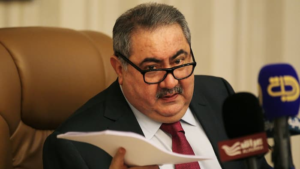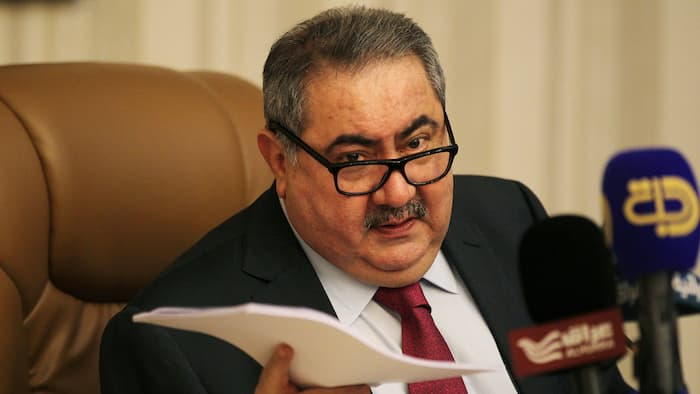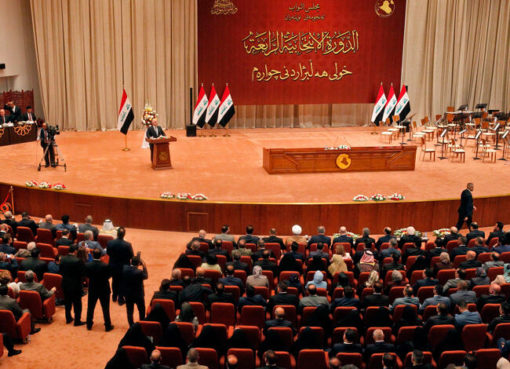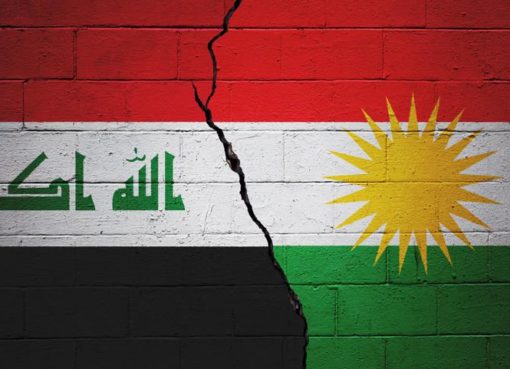 Download PDF: iraq-finance-minister-fights-on-two-fronts-hoshyar-zebari-faces-graft-claims-as-he-tries-to-save-economy-by-erika-solomon
Download PDF: iraq-finance-minister-fights-on-two-fronts-hoshyar-zebari-faces-graft-claims-as-he-tries-to-save-economy-by-erika-solomon
Baghdad, SEPTEMBER 11, 2016
Hoshyar Zebari should have been preparing for loan negotiations that could save his country from economic collapse. Instead, Iraq’s finance minister sat in his office waving a file of papers he claims prove that billions of dollars of state money was embezzled by rival politicians.
In the cauldron of Iraqi politics, Mr Zebari is battling on two fronts — one to plug a gaping hole in government finances; the other to cling on to his job.
While his aides headed to Jordan last week to hold talks with the IMF on the release of the first tranche of a $5.4bn bailout, Mr Zebari was delayed in Baghdad, pushing against the latest in a string of dramatic parliamentary inquiries into corruption.
Some lawmakers accuse him of misusing tens of millions of dinar. A televised parliamentary inquiry last week saw the embattled finance minister struggling to justify much of the expenditure.
Mr Zebari is fighting back by digging out documents that he claims reveal the true extent of corruption in an escalating drama that has rattled the political elite and which cost the defence minister his job last month.
“I’ve started my campaign — the counterattack,” he says. “I didn’t want to galvanise it. But now I’m talking about it, because they [rival politicians] have been playing very dirty.”
The toxic political struggles risk destabilising a country fighting two existential battles — to regain territory from Isis and to reverse the fortunes of its ailing economy.
“It’s distracting — they don’t know how much damage they are causing,” says Mr Zebari, who denies the allegations. “The country is in a war. It has no defence minister … And if it will not have a finance minister tomorrow — it means the country is paralysed, basically.”
Economically, Iraq is at a juncture. The slump in crude prices, coupled with instability that has deterred much-needed investment, triggered a fiscal crisis in Opec’s second-largest oil producer.
Baghdad turned to the IMF for help late last year as it sought to narrow a budget deficit the fund forecasts could reach $17bn this year — equivalent to 12 per cent of Iraq’s gross domestic product.
The IMF agreement meant Baghdad was able to unlock another $18bn in international loans and aid, mostly for the war against Isis and reconstruction. But Mr Zebari warns the deficit could balloon to $28.5bn next year.
“The country is not only facing the war on Daesh [Isis] but an economic war,” he says. “Everything will … be in a state of chaos if this economy fails.”
If the outlook does not improve, Mr Zebari may attempt to issue Iraq’s first eurobond at the end of this year. A similar attempt failed in 2015, but he says Baghdad has a better chance of succeeding because the US has promised $1bn in loan guarantees.
Hoshyar Zebari, Iraq finance minister
Under the IMF programme, the government is supposed to impose new customs and income taxes and cut its huge salary bill and pensions schemes. Yet with the economy in turmoil, trimming a civil service that has between 4m and 7m on its payroll would be politically sensitive and deeply unpopular.
Lawmakers facing a tide of popular frustration are, however, scrambling to prove they are doing something about one issue plaguing the economy — graft so rampant most leaders freely acknowledge it.
“It used to be — you cover me, I cover you,” jokes Amer al-Fayez, an MP. “Now it’s you expose me, I expose you.”
Prime minister Haidar al-Abadi led the charge with revelations last year that thousands of non-existent soldiers were receiving salaries.
Noura al-Bajari, deputy head of parliament’s economy and investment committee, said she and the finance ministry uncovered a scheme that revealed public sector workers were registering for salaries with three state companies.
But some observers worry the anti-corruption drive is a sideshow that will never reach the most powerful politicians who have the deepest pockets.
“The problem is that you have a class of untouchable politicians,” says Renad Mansour, an analyst at the Carnegie Endowment.
Most emblematic of that class is Nouri al-Maliki, the former prime minister who is backed by Iran and militias, many Iraqis say. Mr Zebari accuses Mr Maliki of sparking the current chaos, claiming he is bitter about losing power in 2014. “They want to bring down the temple, out of sheer revenge,” Mr Zebari says.
The files he showed the Financial Times appeared to be part of an earlier probe by the parliamentary finance committee and purported to show how an individual close to the previous government used currency auctions to siphon $6.4bn from the state.
Mr Maliki’s office said Mr Zebari’s allegations were “untrue and unrealistic”, adding he was trying to politicise the current parliament’s inquiries.
“We challenge Mr Zebari to prove there is any connection between us and that person. Making accusations without any evidence or proof shows this is nothing more than a miserable attempt to get out of the bottleneck he has fallen into.”
Mr Zebari says that, in 2012 and 2013, the Maliki government had billions of dollars in surpluses, but when he took office in 2015 there was “only $694m in the government coffers”.
Where did the money go?
“Exactly,” he replies.
Source: FT, SEPTEMBER 11, 2016
https://www.ft.com/content/0a32be00-7a07-11e6-97ae-647294649b28







Comment here